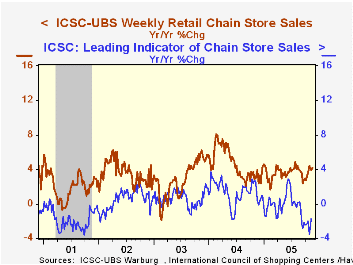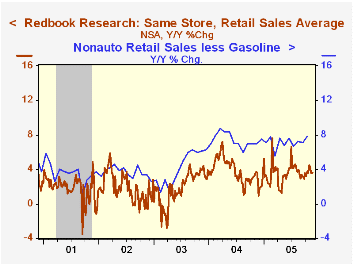 Global| Nov 22 2005
Global| Nov 22 2005Chain Store Sales Up
by:Tom Moeller
|in:Economy in Brief
Summary
The International Council of Shopping Centers (ICSC)-UBS survey indicated that last week, chain store sales recovered more than all of the prior period's decline with a 1.0% jump. It was the second w/w jump that strong this month and [...]

The International Council of Shopping Centers (ICSC)-UBS survey indicated that last week, chain store sales recovered more than all of the prior period's decline with a 1.0% jump. It was the second w/w jump that strong this month and it lifted the average level of sales in November 1.2% above October which rose 0.1% from September.
During the last ten years there has been a 51% correlation between the y/y change in chain store sales and the change in non-auto retail sales less gasoline, as published by the US Census Department. Chain store sales correspond directly with roughly 14% of non-auto retail sales less gasoline. The leading indicator of chain store sales from ICSC rose 0.6% (-1.7% y/y) during the latest week following a 0.2% increase the prior week. The ICSC-UBS retail chain-store sales index is constructed using the same-store sales (stores open for one year) reported by 78 stores of seven retailers: Dayton Hudson, Federated, Kmart, May, J.C. Penney, Sears and Wal-Mart.
Through the second week of November, the Johnson Redbook survey indicated a lesser 0.2% (3.5% y/y) gain in store sales versus October. The survey tracks 15 stores and reflects same-store sales of retailers that account for roughly 85% of the department store category in the Census Bureau's monthly retail sales report.
During the last nine years there has been a 67% correlation between the y/y change in the Redbook store sales index and the change in non-auto retail sales less gasoline, as published by the US Census Department.
| ICSC-UBS (SA, 1977=100) | 11/19/05 | 11/12/05 | Y/Y | 2004 | 2003 |
|---|---|---|---|---|---|
| Total Weekly Chain Store Sales | 458.0 | 453.3 | 4.2% | 4.6% | 2.9% |
Tom Moeller
AuthorMore in Author Profile »Prior to joining Haver Analytics in 2000, Mr. Moeller worked as the Economist at Chancellor Capital Management from 1985 to 1999. There, he developed comprehensive economic forecasts and interpreted economic data for equity and fixed income portfolio managers. Also at Chancellor, Mr. Moeller worked as an equity analyst and was responsible for researching and rating companies in the economically sensitive automobile and housing industries for investment in Chancellor’s equity portfolio. Prior to joining Chancellor, Mr. Moeller was an Economist at Citibank from 1979 to 1984. He also analyzed pricing behavior in the metals industry for the Council on Wage and Price Stability in Washington, D.C. In 1999, Mr. Moeller received the award for most accurate forecast from the Forecasters' Club of New York. From 1990 to 1992 he was President of the New York Association for Business Economists. Mr. Moeller earned an M.B.A. in Finance from Fordham University, where he graduated in 1987. He holds a Bachelor of Arts in Economics from George Washington University.
More Economy in Brief
 Global| Feb 05 2026
Global| Feb 05 2026Charts of the Week: Balanced Policy, Resilient Data and AI Narratives
by:Andrew Cates






